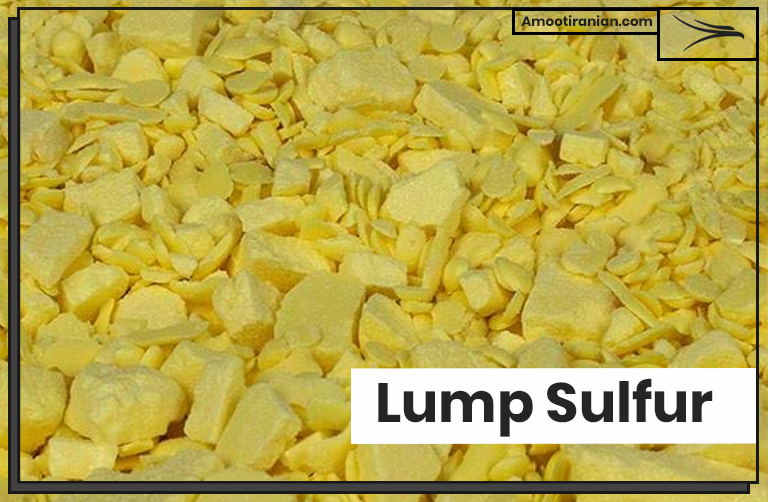What is Lump Sulfur?
.
Lump sulfur, also known as elemental sulfur or native sulfur, is a chemical element with the symbol S and atomic number 16. It is a bright yellow, brittle, nonmetallic solid that occurs naturally as a mineral in various geological formations, such as in salt domes and volcanoes.
.

.
Sulfur lump can be obtained through mining or as a byproduct of petroleum refining and natural gas processing.
It is also produced by the combustion of sulfur-containing fuels, such as coal and oil.
.
What Are the Characteristics of Sulphur Lump?
.
Sulfur Features
| Characteristic | Description |
| Appearance | Bright yellow solid |
| Odor | Faint odor, resembling that of a matchstick |
| Density | 2.07 g/cm³ |
| Melting point | 115.21°C (239.38°F) |
| Boiling point | 444.6°C (832.3°F) |
| Solubility | Insoluble in water, slightly soluble in ethanol, soluble in benzene, carbon disulfide, and other organic solvents |
| Hardness | 1.5 – 2.5 (Mohs scale) |
| Texture | Brittle, non-metallic |
| Crystal system | Orthorhombic |
| Atomic structure | S8 rings, with each sulfur atom bonded to two other sulfur atoms in a crown-shaped structure |
.
Is Sulphur Lump Metallic?
Is sulphur lump shiny or metallic?
No, sulfur lump is not metallic. It is a non-metal element with the chemical symbol S and atomic number 16. Sulfur has physical and chemical properties that are different from those of metals.
.
In its pure form, sulfur is a bright yellow, brittle solid that is not malleable or ductile like metals.
It has a relatively low melting and boiling point and is a poor conductor of electricity and heat. These properties are characteristic of non-metal elements and are distinct from those of metals, which are usually malleable, ductile, and good conductors of electricity and heat.
While sulfur is not metallic, it can sometimes be found in metallic minerals such as sulfides, which are compounds of sulfur and metals like iron, copper, and zinc.
These minerals often have metallic luster and can be mistaken for metals.
.
What Is the Use of Crushed Lump Sulphur?
Crushed sulfur lump, also known as crushed sulfur or ground sulfur, is a form of elemental sulfur that has been processed into smaller pieces or a fine powder.
.
It has several uses in various industries, such as:
- Agricultural industry: Crushed sulfur is commonly used as a soil amendment to lower soil pH and control fungal diseases in crops. It is also used as an ingredient in some pesticides.
- Chemical industry: Crushed sulfur is used as a raw material in the production of sulfuric acid, sulfur dioxide, and other sulfur-based chemicals.
- Industrial applications: Crushed sulfur is used as a component in the production of sulfur concrete, which is used in the construction of acid-resistant structures and linings. It is also used in the production of rubber products, such as tires, and in the manufacture of sulfuric acid batteries.
- Personal care industry: Crushed sulfur is used as an ingredient in some skincare products to treat acne, dandruff, and other skin conditions.
.
In addition, crushed sulfur can also be used as a fungicide and insecticide in gardening and pest control.
.
Which One Is Used in the Production of Sulfuric Acid: Lump or Granular Sulfur?
Both sulfur lump and granular can be used in the production of sulfuric acid. The choice between lump sulfur and granular sulfur depends on:
- the specific production process
- the equipment used
.

.
1. Lump sulfur in Sulfuric Acid Production
Lump sulfur is typically used in the traditional contact process for sulfuric acid production, where sulfur dioxide gas is produced by burning sulfur lump and then reacted with oxygen in the presence of a catalyst to produce sulfur trioxide gas.
The sulfur trioxide gas is then absorbed in water to produce sulfuric acid.
2. Granular sulfur in Sulfuric Acid Production
Granular sulfur, on the other hand, is often used in the newer wet sulfuric acid production process, where sulfur dioxide gas is produced by burning granular sulfur in the presence of water vapor.
The sulfur dioxide gas is then oxidized to sulfur trioxide and absorbed in water to produce sulfuric acid.
.

.
In both cases, the purity and quality of the sulfur used can affect the efficiency and output of the production process.
.
Who Makes Sulphur Granules in Iran? What About Sulfur Lump?
Amoot Iranian Trading Company!
Looking for a reliable and trustworthy trading company for purchasing sulfur?
Look no further than Amoot Iranian Trading Company!
.

.
We specialize in selling and exporting lump and granular sulfur of Iran and Turkmenistan.
Our high-quality sulfur products are competitively priced, ensuring that our clients receive the best value for their money.
.
In addition to lump and granular sulfur, we also produce sulfur powder in our factory in the south of Iran. Our state-of-the-art facility ensures that our sulfur powder is of the highest quality, meeting the needs of a wide range of industries.
.
At Amoot, we understand the importance of quality control, which is why we provide SGS certification for our products. This guarantees that our sulfur products meet the highest international standards.
.

.
To ensure that our clients have access to our products at all times, we maintain stocks of sulfur in the south of Iran (BND), which can be visited by buyers for inspection.
With offices in Mashhad and Tehran of Iran, as well as UAE and South Africa, we are perfectly positioned to serve clients from all around the world.
.
Contact us today to learn more about our sulfur products and how we can assist you with your sulfur needs.
